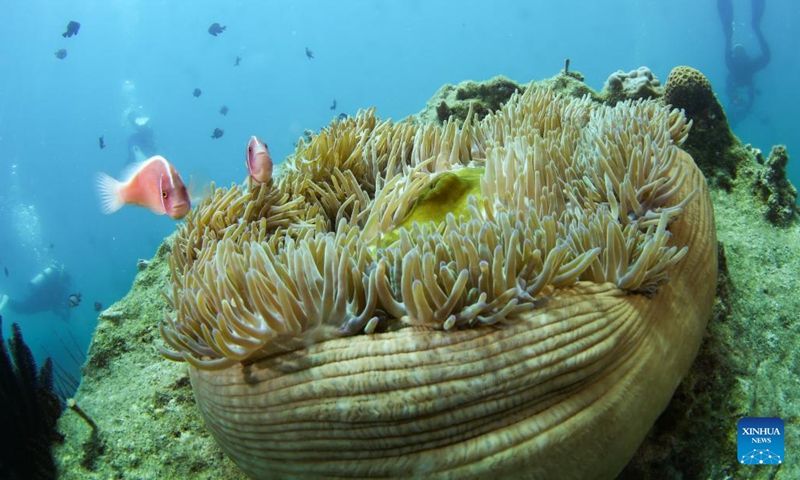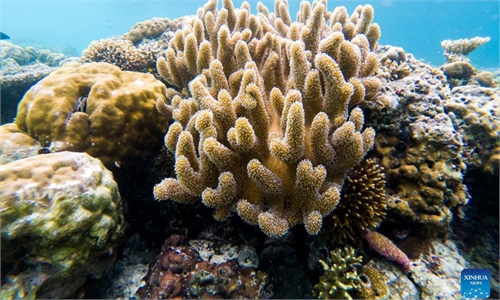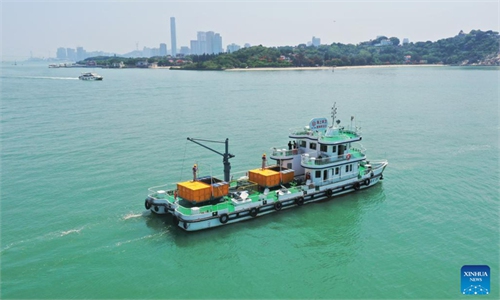China bans release of radioactive wastewater as Japan moves closer to reckless dumping plan

This photo taken on May 22, 2021 shows clownfishes and sea anemone at a marine ranch in the sea area of Wuzhizhou Island in Sanya, south China's Hainan Province. The butterfly-shaped Wuzhizhou Island is located in Sanya's Haitang Bay and is surrounded by clean waters and stunning scenery. The marine ranch in the sea area of Wuzhizhou Island is China's first tropical marine ranch. Photo: Xinhua
China plans to ban the release of radioactive wastewater into the ocean, which would pollute the marine environment and damage marine ecology, in its second draft of the amended Marine Environmental Protection Law. The draft underwent a second review by the Standing Committee of the National People's Congress on Monday, according to media reports, the same day Japan was reported to have moved a step closer to finishing the system it will use to dump the Fukushima nuclear-contaminated wastewater.
The discharge of radioactive items, waste or any other harmful items into the ocean is strictly prohibited, according to the amendments newly included in the second draft, which will also establish a detection system for marine litter.
According to the amendments, any unit or individual engaged in activities that affect the marine environment shall take effective measures to prevent and reduce marine environmental pollution and ecological damage.
The amendments also call for monitoring of sewage outlets, in accordance with regulations. The amendments vow to establish and improve the whole chain management system of nearshore water bodies, sewage outlets into the sea, sewage pipelines and pollution sources.
The amendments were added after proposals were made by personnel from various fields including members of the Standing Committee of the National People's Congress, experts and the public after the first review, according to media reports.
They came amid growing concerns over marine safety among Chinese people caused by Japan's reckless plan to dump nuclear-contaminated wastewater from Fukushima into the ocean.
The second review also coincided with the latest move by Japan to complete its system that will be used to dump the Fukushima nuclear-contaminated wastewater. The operator of the crippled Fukushima Daiichi nuclear power plant on Monday removed heavy machinery used to drill the tunnel for the release, which comes amid continuous and growing opposition both at home and abroad.
In December 2022, the 38th meeting of the Standing Committee of the 13th National People's Congress conducted the first review of the draft amendment to the Marine Environmental Protection Law. Spokesperson of the commission, Zang Tiewei, detailed on Sunday that from December 30, 2022, to January 28, 2023, during a period of public consultation for the draft amendment to the law, a total of 167 opinions were received from 89 people, while five letters were received from the public.
Public comment mainly put forward opinions and suggestions on protecting typical representative marine ecosystems, improving ecological protection compensation systems, strengthening the monitoring of pollution discharge outlets, and enhancing public participation, and some opinions were adopted following further research, Zang said.
According to the opinions of all parties, the draft for a second review submitted to the Standing Committee meeting intends to make eight main amendments, including incorporating safeguarding national marine rights and interests into the legislation purpose, adding a target responsibility system and assessment and evaluation system, and regulatory talk system, strengthening the construction of marine environmental supervision and management system that integrates land and sea, and strengthening the prevention and control of marine environmental pollution.
The prevention and control of land-based pollution has become a key part of marine environmental protection. In order to strengthen the prevention and control of terrestrial pollution, strengthen the construction of marine environmental supervision and management system that integrates land and sea, the amendment plans to put forward the provisions that any work unit and individual engaged in activities affecting the marine environment should take effective measures to prevent and mitigate marine environmental pollution and ecological destruction.
In addition, governments at all levels and their relevant departments should strengthen the connection and coordination of planning, standards, monitoring and other supervision and management systems in accordance with the principle of integrating land and sea.
Enterprises and institutions and other producers and operators implementing the pollution permit management should meet set requirements stipulated in the pollution permits addressing the type and concentration of pollutants, the way and direction of pollution discharge, and self-monitoring. The amendment also requires the establishment of a comprehensive governance system for near-shore waters, sea discharge outlets, sewage pipelines, and pollution sources.
The United Nations adopted the first-ever treaty to protect marine life in the high seas on June 20, which vows to establish ground rules for conducting environmental impact assessments for commercial activities in the oceans.
Global Times


